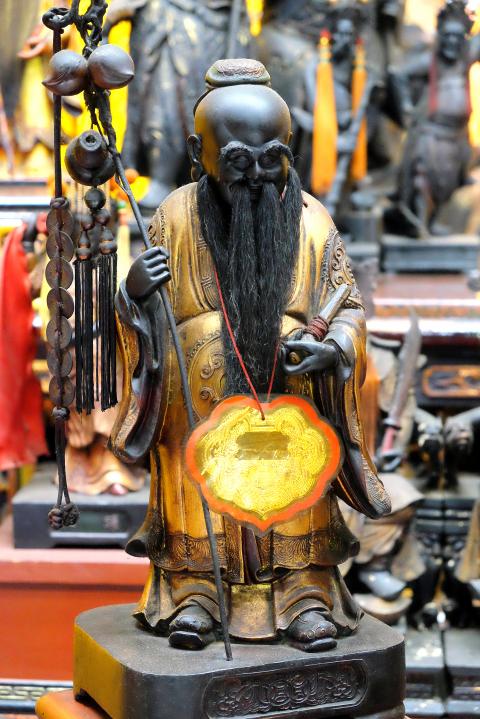Legislator Wu Yi-chen (吳宜臻) urges couples to be vigilant on Valentine’s Day.
“Don’t be impulsive, don’t relent to coaxing, don’t be swept away by passion, don’t upload [private photos of each other],” Wu said at a Wednesday press conference at the Legislative Yuan.
Wu is about to push an amendment to the Sexual Harassment Prevention Act (性騷擾防治法) in response to a recent rash of privacy infringements between ex-couples.

Photo: AFP
From 2012 to 2013, major private photo scandals increased from 24 to 42. The majority of these photos were taken in the context of a romantic relationship and later used for retribution, according to the Taipei Women’s Rescue Foundation (婦女救援基金會).
Neele Wang (王建中), a long-time hotline counselor in Taipei, said that acrimonious fighting, bitter breakups and frightening divorce rates are societal trends that have become a major focus of his work.
Wang’s Focus and Forecast Consulting Company is a provider of employee assistance programs — services meant to boost employee productivity in the workplace. One service is hotline counseling to employees across Taiwan who have personal, legal, financial and health questions. A lot of the questions he deals with are personal.
“We have many different services, but get a lot of phone calls about relationships. It’s one of the top three reasons employees call,” Wang said.
“It’s not just men who behave in frightening ways — women do it, too. Shouting, throwing things, slamming doors, or something worse when they become angry. It’s not uncommon,” Wang said.
In Taiwan, new pressures on modern love include changing gender expectations, record-long working hours and social technologies that can reduce real-life human contact, Wang said. But the basic romantic relationship problems, such as conflicts with in-laws, are the same.
“For the most part, many of the problems that plague relationships are versions of problems that existed before,” he said. “You can solve them with good communication.”
“A very damaging thing we see a lot is one person saying yes, when he thinks no,” Wang said.
“He says ‘okay,’ but is secretly furious and thinks, ‘Why would you do this?’ He finds his mates and complains, but he does not complain to [his girlfriend]. He does not want her to become angry or set her off in any way. They don’t resolve their issues. They build up and then come out at one time, and sometimes it is a destructive expression of anger.”
HAPPINESS WORKSHOP
In the weeks leading up to Valentine’s Day, Johnny Chen (陳俊良) of Focus and Forecast has been busy planning the Happiness Workshop (幸福工作坊), a series of Thursday night classes taught by invited professionals.
The course begins on Feb. 27 and features classes on maintaining a peaceful and productive relationship. There’s “getting to know yourself,” “understanding the influence your nuclear family has on your relationships” and a psychometric assessment based on the Myers-Briggs Type Indicator that’s used to help one partner understand the other’s communication style. There is a unit on positive ways to handle a breakup.
So far, couples have not rushed to enroll. But Chen, a 20-something in his first corporate job, stands behind the merits of his brainchild.
“It addresses a real problem. Maybe it’s a problem people don’t want to talk about,” he said. “Finding a romantic spark isn’t too hard, you could do that by chance walking down a street. What’s hard is maintaining a relationship and not letting it sour.”
For more information about the Happiness Workshop contact Johnny Chen at (02) 3765-3313 ext. 23, or go to (Chinese): www.goo.gl/XGoEUg.

Taiwan has next to no political engagement in Myanmar, either with the ruling military junta nor the dozens of armed groups who’ve in the last five years taken over around two-thirds of the nation’s territory in a sprawling, patchwork civil war. But early last month, the leader of one relatively minor Burmese revolutionary faction, General Nerdah Bomya, who is also an alleged war criminal, made a low key visit to Taipei, where he met with a member of President William Lai’s (賴清德) staff, a retired Taiwanese military official and several academics. “I feel like Taiwan is a good example of

March 2 to March 8 Gunfire rang out along the shore of the frontline island of Lieyu (烈嶼) on a foggy afternoon on March 7, 1987. By the time it was over, about 20 unarmed Vietnamese refugees — men, women, elderly and children — were dead. They were hastily buried, followed by decades of silence. Months later, opposition politicians and journalists tried to uncover what had happened, but conflicting accounts only deepened the confusion. One version suggested that government troops had mistakenly killed their own operatives attempting to return home from Vietnam. The military maintained that the

Before the last section of the round-the-island railway was electrified, one old blue train still chugged back and forth between Pingtung County’s Fangliao (枋寮) and Taitung (台東) stations once a day. It was so slow, was so hot (it had no air conditioning) and covered such a short distance, that the low fare still failed to attract many riders. This relic of the past was finally retired when the South Link Line was fully electrified on Dec. 23, 2020. A wave of nostalgia surrounded the termination of the Ordinary Train service, as these train carriages had been in use for decades

Lori Sepich smoked for years and sometimes skipped taking her blood pressure medicine. But she never thought she’d have a heart attack. The possibility “just wasn’t registering with me,” said the 64-year-old from Memphis, Tennessee, who suffered two of them 13 years apart. She’s far from alone. More than 60 million women in the US live with cardiovascular disease, which includes heart disease as well as stroke, heart failure and atrial fibrillation. And despite the myth that heart attacks mostly strike men, women are vulnerable too. Overall in the US, 1 in 5 women dies of cardiovascular disease each year, 37,000 of them